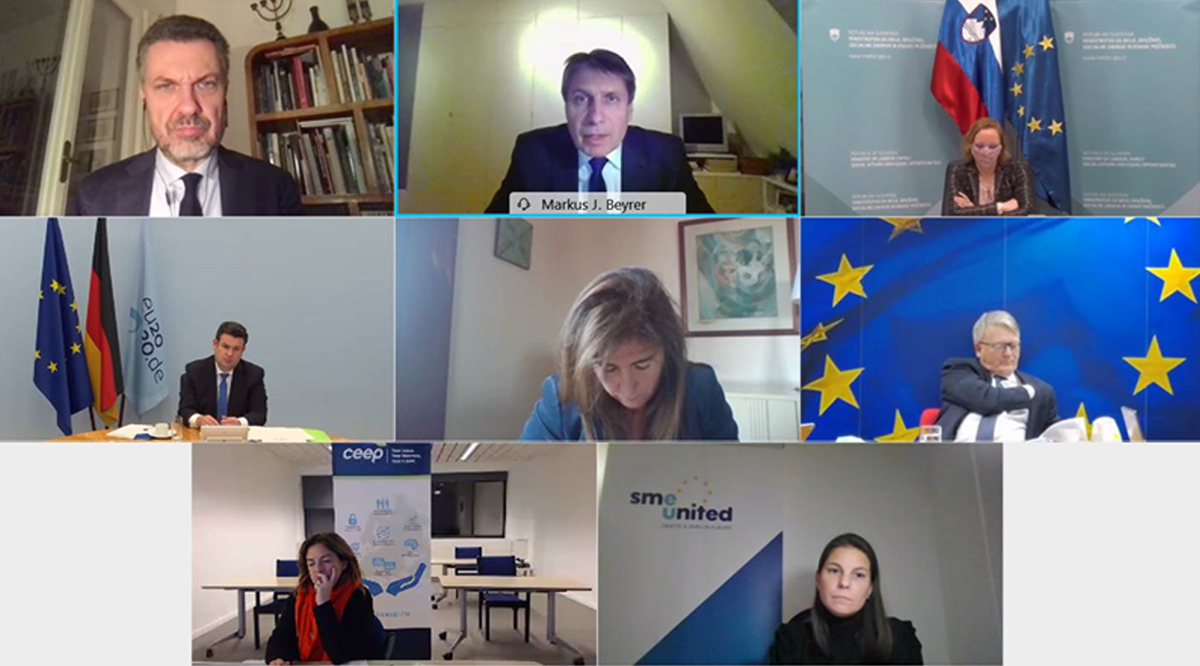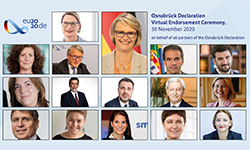BusinessEurope Headlines No. 2020-40
Social pillar action plan needs to focus on growth and employment

It is more important than ever that the EU prioritises measures, including in social affairs, which will support economic growth and employment and deal with the impact of COVID-19. This has to be reflected as main focus of the action plan on the European pillar of social rights, and the European Semester process is the right tool for this. A focus on employment and skills is now highly needed to meet employers’ needs and create employment opportunities for workers. This was the key message of BusinessEurope Director General, Markus J. Beyrer in a meeting between European social partners and the German Minister for labour, Hubertus Heil, on 1 December. Beyrer also called for a dedicated exchange between EU and national social partners, national governments and the European Commission before the action plan is published. He highlighted as well the employers' opposition to a directive on minimum wages, calling instead for a Council recommendation in line with the Treaty, national competences and social partner autonomy.
Contact: Rebekah Smith
New publication:
Schrems II - the impact
 BusinessEurope, DigitalEurope, the European Round Table for Industry (ERT) and the European Automobile Manufacturers Association (ACEA) on 26 November released a report in relation to the impact of the recent Schrems II case. This landmark judgement by the Court of Justice of the European Union dramatically altered the state of international data flows, not only by annulling the EU-US Privacy Shield, but also adding greater responsibilities on businesses who utilise Standard Contractual Clauses (SCCs) to transfer data from the EU to any other 3rd country. The report demonstrates results of a survey that its authors have carried out with its members over the past months and shows that SCCs are by far the most widely used international transfer mechanism by European companies hailing from a variety of sectors and come in many sizes. In fact, 70% of SMEs that took part rely upon them regularly to offer their own services to 3rd country customers or rely on the business services of others utilising SCCs. As a result, it is clear that SCCs enable Europe to compete in and utilise the global economy. These findings are concerning considering recent draft Recommendations from the European Data Protection Board (EDPB) that attempt to interpret the Schrems II judgement for national regulators seem to render use of SCCs wholly impractical. BusinessEurope will take part in the ongoing consultation in an aim to ensure Europe can continue to access global data flows in a safe and pragmatic way. Read the full Schrems II impact report here.
BusinessEurope, DigitalEurope, the European Round Table for Industry (ERT) and the European Automobile Manufacturers Association (ACEA) on 26 November released a report in relation to the impact of the recent Schrems II case. This landmark judgement by the Court of Justice of the European Union dramatically altered the state of international data flows, not only by annulling the EU-US Privacy Shield, but also adding greater responsibilities on businesses who utilise Standard Contractual Clauses (SCCs) to transfer data from the EU to any other 3rd country. The report demonstrates results of a survey that its authors have carried out with its members over the past months and shows that SCCs are by far the most widely used international transfer mechanism by European companies hailing from a variety of sectors and come in many sizes. In fact, 70% of SMEs that took part rely upon them regularly to offer their own services to 3rd country customers or rely on the business services of others utilising SCCs. As a result, it is clear that SCCs enable Europe to compete in and utilise the global economy. These findings are concerning considering recent draft Recommendations from the European Data Protection Board (EDPB) that attempt to interpret the Schrems II judgement for national regulators seem to render use of SCCs wholly impractical. BusinessEurope will take part in the ongoing consultation in an aim to ensure Europe can continue to access global data flows in a safe and pragmatic way. Read the full Schrems II impact report here.
Contact: Patrick Grant
Osnabrück Declaration: adapting vocational education and training
 A key priority for better skills training is to improve the updating of curricula in the Member States. This needs to take into account labour market and skills intelligence on the skills content of changing jobs and new jobs. Cooperation between Member States and social partners is key when it comes to the design and delivery of vocational education and training (VET). In particular, it is important that this cooperation focuses in the short-term on better reflecting in curricula and related qualifications the skills needs identified in the labour market for the digital and green transitions. Furthermore, it is crucial that Member States and social partners work together to use the Recovery and Resilience Facility to make the necessary investments in skills that will set the recovery fully into motion. These were the key messages from BusinessEurope Director General, Markus J. Beyrer during the ceremony to endorse the Osnabrück declaration that took place at the margins of the Education Council on 30 November. The Osnabrück Declaration is a 5-year strategy that identifies priorities for EU level cooperation in VET. It has been endorsed by the education ministers of the EU 27 Member States, the EEA-EFTA states (Iceland, Liechtenstein, and Norway) and candidate countries and the European social partners. The declaration has been prepared in the framework of the Copenhagen Process, which was launched in 2002 to foster EU cooperation in VET.
A key priority for better skills training is to improve the updating of curricula in the Member States. This needs to take into account labour market and skills intelligence on the skills content of changing jobs and new jobs. Cooperation between Member States and social partners is key when it comes to the design and delivery of vocational education and training (VET). In particular, it is important that this cooperation focuses in the short-term on better reflecting in curricula and related qualifications the skills needs identified in the labour market for the digital and green transitions. Furthermore, it is crucial that Member States and social partners work together to use the Recovery and Resilience Facility to make the necessary investments in skills that will set the recovery fully into motion. These were the key messages from BusinessEurope Director General, Markus J. Beyrer during the ceremony to endorse the Osnabrück declaration that took place at the margins of the Education Council on 30 November. The Osnabrück Declaration is a 5-year strategy that identifies priorities for EU level cooperation in VET. It has been endorsed by the education ministers of the EU 27 Member States, the EEA-EFTA states (Iceland, Liechtenstein, and Norway) and candidate countries and the European social partners. The declaration has been prepared in the framework of the Copenhagen Process, which was launched in 2002 to foster EU cooperation in VET.
Contact: Robert Plummer
WTO Appellate Body: it’s urgent to find a solution
 “Behind every trade dispute that comes to the World Trade Organisation (WTO) there are companies and companies’ interests. With an increase in trade frictions around the world it is even more important to have an independent, impartial and transparent way of settling trade disputes”, said Luisa Santos, Deputy Director General of BusinessEurope, at an event organised by the Business Council of Canada that had the participation of several business organisations from around the world. A non-functional dispute settlement system in the WTO, Santos added, creates legal uncertainty and will potentially lead countries to explore alternative solutions. In the end this will be detrimental to multilateralism and rules-based trade. The event aimed at discussing ways to solve the deadlock in the WTO Appellate Body and other areas that are critical for the WTO reform. “Finding a solution for the WTO Appellate Body should be a priority and a matter of urgency. We cannot afford to wait while trying to address other shortcomings in areas that relate to rule making or market access. A step by step approach is desirable and will likely produce better results in a shorter period of time”, Santos concluded.
“Behind every trade dispute that comes to the World Trade Organisation (WTO) there are companies and companies’ interests. With an increase in trade frictions around the world it is even more important to have an independent, impartial and transparent way of settling trade disputes”, said Luisa Santos, Deputy Director General of BusinessEurope, at an event organised by the Business Council of Canada that had the participation of several business organisations from around the world. A non-functional dispute settlement system in the WTO, Santos added, creates legal uncertainty and will potentially lead countries to explore alternative solutions. In the end this will be detrimental to multilateralism and rules-based trade. The event aimed at discussing ways to solve the deadlock in the WTO Appellate Body and other areas that are critical for the WTO reform. “Finding a solution for the WTO Appellate Body should be a priority and a matter of urgency. We cannot afford to wait while trying to address other shortcomings in areas that relate to rule making or market access. A step by step approach is desirable and will likely produce better results in a shorter period of time”, Santos concluded.
Contact: Sofia Bournou
Mercosur: business calls for swift ratification
 At the initiative of the Confederation of Portuguese Business (CIP), the business confederations of Europe and Mercosur countries met on 26 November 2020 for the first time, within the scope of the preparatory work for the Portuguese presidency of the Council of the European Union, which takes place in the first half of 2021. On this occasion, the business confederations of the two blocs issued a Joint Statement calling for the rapid ratification and implementation of the agreement between the European Union and Mercosur, warning that a delay could jeopardise the full potential of the opportunities offered by the deal. The Joint Statement also reiterated the full support of the business communities to work together with the authorities of the different countries for the effective implementation of all provisions of the agreement upon its entry into force, including those related to the Paris Agreement on climate change and on cooperation on the climate-related aspects of trade between the two sides.
At the initiative of the Confederation of Portuguese Business (CIP), the business confederations of Europe and Mercosur countries met on 26 November 2020 for the first time, within the scope of the preparatory work for the Portuguese presidency of the Council of the European Union, which takes place in the first half of 2021. On this occasion, the business confederations of the two blocs issued a Joint Statement calling for the rapid ratification and implementation of the agreement between the European Union and Mercosur, warning that a delay could jeopardise the full potential of the opportunities offered by the deal. The Joint Statement also reiterated the full support of the business communities to work together with the authorities of the different countries for the effective implementation of all provisions of the agreement upon its entry into force, including those related to the Paris Agreement on climate change and on cooperation on the climate-related aspects of trade between the two sides.
Contact: Eleonora Catella
European Semester 2021: recover from crisis; focus on labour market reforms
 At the present time, employment and skills should be the two main overarching priorities for EU and national employment and social policy-making. Focusing on these growth-oriented solutions for economic and social development is the best way to enable enterprises and workers to overcome the crisis. The challenge for the Member States is to maintain the necessary focus on crisis response, such as short-time work schemes, and at the same time make good use of the important resources available for their national recovery and resilience plans to design and implement with their social partners the necessary structural labour market reforms. As part of the upcoming action plan on the European pillar of social rights, BusinessEurope proposes a particular focus on investment and reforms to improve the performance of active labour market policies, and of vocational education and training systems. For example, managing the digital and green transitions requires updating curricula and qualifications more quickly and effectively than presently to ensure people have the required skills. As regards employment services, better cooperation between public and private employment services is needed to encourage employment in diverse forms of work and ensure smooth job to job transitions, including between sectors. These were the key messages by Maxime Cerutti, BusinessEurope Social Affairs Director, in his intervention during a joint meeting of the Council’s Employment and Social Protection Committees to discuss the employment and social aspects of the recently published European Commission’s Autumn Package.
At the present time, employment and skills should be the two main overarching priorities for EU and national employment and social policy-making. Focusing on these growth-oriented solutions for economic and social development is the best way to enable enterprises and workers to overcome the crisis. The challenge for the Member States is to maintain the necessary focus on crisis response, such as short-time work schemes, and at the same time make good use of the important resources available for their national recovery and resilience plans to design and implement with their social partners the necessary structural labour market reforms. As part of the upcoming action plan on the European pillar of social rights, BusinessEurope proposes a particular focus on investment and reforms to improve the performance of active labour market policies, and of vocational education and training systems. For example, managing the digital and green transitions requires updating curricula and qualifications more quickly and effectively than presently to ensure people have the required skills. As regards employment services, better cooperation between public and private employment services is needed to encourage employment in diverse forms of work and ensure smooth job to job transitions, including between sectors. These were the key messages by Maxime Cerutti, BusinessEurope Social Affairs Director, in his intervention during a joint meeting of the Council’s Employment and Social Protection Committees to discuss the employment and social aspects of the recently published European Commission’s Autumn Package.
Contact: Anna Kwiatkiewicz-Mory
Thoughts on the future of multilateralism and international cooperation
 “Trade plays a key role in the rapid and sustainable recovery of Europe from the COVID-19 pandemic and international cooperation in this field is essential”, argued Sofia Bournou, Senior Adviser in the International Relations Department of BusinessEurope at a Hanns Seidel Stiftung webinar dedicated to the future of the international trade order and multilateralism that took place on 2 December. Starting from the impact of COVID-19 pandemic on trade and the economy, Bournou emphasised the importance of international cooperation in the area of healthcare, in order to ensure that the multilateral toolbox is updated to address the current needs and ensure that future crises will be contained. Panellists argued that as the world order changes and countries use more and more trade policy instruments to address other policy objectives, it is important that the EU protects its interests without becoming protectionist. “The EU can use its vast network of trade agreements to increase access to third markets and opportunities while at the same time ensuring a level playing field”, concluded Bournou.
“Trade plays a key role in the rapid and sustainable recovery of Europe from the COVID-19 pandemic and international cooperation in this field is essential”, argued Sofia Bournou, Senior Adviser in the International Relations Department of BusinessEurope at a Hanns Seidel Stiftung webinar dedicated to the future of the international trade order and multilateralism that took place on 2 December. Starting from the impact of COVID-19 pandemic on trade and the economy, Bournou emphasised the importance of international cooperation in the area of healthcare, in order to ensure that the multilateral toolbox is updated to address the current needs and ensure that future crises will be contained. Panellists argued that as the world order changes and countries use more and more trade policy instruments to address other policy objectives, it is important that the EU protects its interests without becoming protectionist. “The EU can use its vast network of trade agreements to increase access to third markets and opportunities while at the same time ensuring a level playing field”, concluded Bournou.
Contact: Sofia Bournou
AI: managing risk
 On 26 November, Digital Advisor Patrick Grant gave a keynote speech and took part in a panel discussion on Artificial Intelligence and what it means for Central and Eastern Europe at an online event organised by the Confederation of Industry of the Czech Republic. He gave the latest insight on the view from Brussels in relation to development of AI policy that is set to be delivered by the European Commission next year. There is a growing concern that while the Commission is taking a beneficial risk-based approach to this (only setting new rules for what it determines as “high-risk” AI), this will be in vain as sector-specific and lower risk product legislation (eg. the General Product Safety Directive) are also being updated. If so, it seems the EU is about to update its entire product safety framework for AI and when taken together, not adhering to risk-based policy making. Later, in the panel discussion alongside policy makers of the Commission and Parliament, Grant explained: “an element of risk will always exist in society, there is no such thing as a zero-risk product, an element of residual risk will always exist and businesses are working to make that as small as possible”. A recording of the entire conference can be viewed here.
On 26 November, Digital Advisor Patrick Grant gave a keynote speech and took part in a panel discussion on Artificial Intelligence and what it means for Central and Eastern Europe at an online event organised by the Confederation of Industry of the Czech Republic. He gave the latest insight on the view from Brussels in relation to development of AI policy that is set to be delivered by the European Commission next year. There is a growing concern that while the Commission is taking a beneficial risk-based approach to this (only setting new rules for what it determines as “high-risk” AI), this will be in vain as sector-specific and lower risk product legislation (eg. the General Product Safety Directive) are also being updated. If so, it seems the EU is about to update its entire product safety framework for AI and when taken together, not adhering to risk-based policy making. Later, in the panel discussion alongside policy makers of the Commission and Parliament, Grant explained: “an element of risk will always exist in society, there is no such thing as a zero-risk product, an element of residual risk will always exist and businesses are working to make that as small as possible”. A recording of the entire conference can be viewed here.
Contact: Patrick Grant
Competition policy supporting the Green Deal
 BusinessEurope responded to the call for contributions on how competition policy can contribute to the Green Deal. Competition policy has an important role to play in making the Green Deal a success and supporting European businesses in their transformation towards climate neutrality, sustainable growth, job creation and prosperity. As such, it complements specific legislative actions to reach Green Deal objectives. There is a need for more guidance and clarity to encourage companies to collaborate in certain situations and pursue environmental and sustainability objectives and EU State aid policy should support good aid, such as aid to reach Green Deal objectives, while fundamentally safeguarding a market driven European economy.
BusinessEurope responded to the call for contributions on how competition policy can contribute to the Green Deal. Competition policy has an important role to play in making the Green Deal a success and supporting European businesses in their transformation towards climate neutrality, sustainable growth, job creation and prosperity. As such, it complements specific legislative actions to reach Green Deal objectives. There is a need for more guidance and clarity to encourage companies to collaborate in certain situations and pursue environmental and sustainability objectives and EU State aid policy should support good aid, such as aid to reach Green Deal objectives, while fundamentally safeguarding a market driven European economy.
![]() Contact: Erik Berggren
Contact: Erik Berggren
Calendar 
- 3 December: Webinar on the implementation of EU free trade agreements (FTAs)
- 10 December: Webinar on mobility of professionals between the EU and Canada
- 22-25 February: EU Industry Week 2021
Not yet a subscriber? Register here.
Reminder: please have a look at our privacy policy